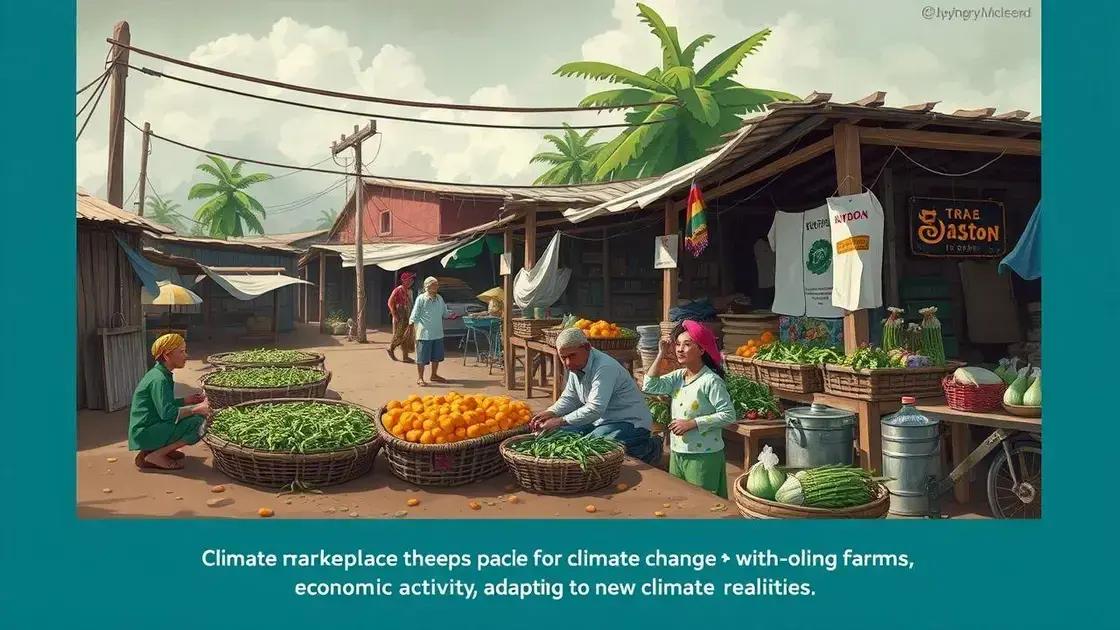Climate change reports: what they mean for you

Anúncios
Climate change reports provide critical data that informs individuals and policymakers, enabling effective actions that reduce carbon footprints, support sustainable practices, and promote community resilience against environmental impacts.
Climate change reports provide essential insights into how global warming affects our planet. But have you ever wondered how these findings influence your daily decisions? Let’s dive in!
Anúncios
Understanding the key findings of climate change reports
Understanding climate change reports is essential to grasp the ongoing challenges our planet faces. These documents compile data and highlight vital trends that can impact our lives. They reveal the current state of our climate and point out areas needing attention.
Key Findings
Several important findings often emerge from these reports. For instance, the Earth’s average temperature has risen significantly over the last century. Ice sheets are melting at an alarming rate, leading to rising sea levels. These changes are not just numbers; they directly affect wildlife, weather patterns, and even food supplies for billions.
- Increased temperatures: The Intergovernmental Panel on Climate Change (IPCC) reports that global temperatures are rising at alarming rates.
- Extreme weather events: There is a spike in hurricanes, droughts, and wildfires around the world.
- Impact on biodiversity: Many species are facing extinction as their habitats become unlivable.
- Human health risks: Air quality and heatwaves are leading to increased health concerns for populations.
Reports also discuss methane and carbon dioxide levels, which are climbing higher than ever before. These gases trap heat in our atmosphere, preventing it from escaping into space. As a result, we see changes not only in temperature but also in precipitation patterns. Some areas experience flooding and others face droughts, creating unpredictable conditions for farmers.
Anúncios
One of the critical aspects of climate change reports is their ability to guide policymakers. By utilizing this data, governments can make informed decisions regarding regulations and conservation efforts. Engaging communities in climate action can also stem from key insights provided in these reports. They serve as a wake-up call for society to collaborate towards lasting solutions.
How climate change reports affect local economies

Climate change reports significantly impact local economies. They provide valuable data that governments and businesses use to plan and adapt to changing conditions. By understanding these reports, communities can make informed decisions that affect their financial futures.
Economic impacts of climate change
Local economies often depend on natural resources and weather patterns. When climate change disrupts these factors, significant economic shifts can occur. For example, farmers may face crop failures due to extreme weather. This leads to higher food prices and loss of income for farmers.
- Job losses: Many industries, such as agriculture and tourism, can suffer due to changing climates.
- Increased costs: Businesses may need to invest in adaptation strategies, raising operational costs.
- Migration: As areas become less habitable, populations may move, leading to shifts in labor markets.
- Infrastructure damage: Severe weather events can damage roads and buildings, necessitating costly repairs.
Additionally, climate change can cause disruptions in supply chains. When natural disasters strike, it can be challenging for businesses to obtain necessary materials. This ripple effect can slow production and impact the availability of goods, leading consumers to pay more.
The insights from climate change reports help local governments prioritize initiatives to mitigate these effects. By investing in sustainable infrastructure and encouraging green technologies, communities can build resilience against future climate impacts. Engaging local businesses in discussions about adaptation strategies is essential.
Lastly, understanding these reports can also enhance community awareness about climate-related risks. When locals know the possible implications, they can advocate for necessary changes and support initiatives aimed at creating a more sustainable economy.
The role of policy in addressing climate change
Policy plays a vital role in addressing climate change and mitigating its effects on our planet. Sound policies can create frameworks that guide behavior in both individuals and industries, fostering sustainability.
Importance of climate policies
Without effective policies, efforts to combat climate change can be fragmented and ineffective. Governments worldwide are recognizing the need for comprehensive approaches to address environmental issues. These policies can promote clean energy, protect natural resources, and reduce greenhouse gas emissions.
- Regulations: Strict regulations can limit emissions from industries and promote cleaner alternatives.
- Incentives: Financial incentives for renewable energy can encourage businesses and homeowners to make eco-friendly choices.
- International agreements: Treaties like the Paris Agreement urge nations to commit to lowering emissions and sharing technologies.
- Public awareness: Policies can also aim to educate the public about climate change impacts and necessary actions.
Additionally, local policies can directly influence day-to-day practices. For instance, cities can implement programs that promote recycling, composting, and energy efficiency. These actions not only reduce waste but also inspire communities to engage more actively in environmental stewardship.
Effective climate policies also take into account the economic implications. By investing in green technologies and sustainable practices, governments can stimulate job growth. Transitioning to a low-carbon economy can create new industries and opportunities.
Moreover, policies must be adaptable to changes in climate science and societal needs. Continuous research and advancements can inform policy adjustments, ensuring they remain effective and relevant. Collaborating with scientists, businesses, and communities helps to develop robust strategies that reflect real-world complexities.
Personal actions informed by climate change data

Understanding climate change data can empower individuals to take meaningful actions. By being informed, people can adjust their habits to reduce their carbon footprint and contribute to a healthier planet.
Making informed choices
When individuals have access to reliable climate change data, they can make better decisions in their daily lives. For example, knowing which activities produce the most emissions can help people prioritize actions that matter. Simple changes in transportation, energy use, and waste can lead to significant reductions in greenhouse gases.
- Reducing car use: Opting for public transportation, biking, or walking can lower emissions.
- Energy efficiency: Using energy-efficient appliances helps cut down on electricity use.
- Mindful consumption: Buying local and seasonal foods reduces the carbon footprint of transporting goods.
- Conserving water: Simple actions like fixing leaks and using water-saving fixtures can help conserve precious resources.
Besides changing personal habits, individuals can also engage in community-led initiatives. Participating in local clean-up days, tree-planting events, or conservation projects raises awareness and promotes collective action. These efforts can help cities become more resilient to climate impacts.
Additionally, advocating for policies that support sustainability is another way individuals can contribute. Learning about local laws and initiatives can lead to informed discussions with neighbors and community leaders about necessary changes. It allows people to become active participants in shaping a sustainable future.
Empowerment through knowledge is crucial; when people know what actions can lead to a positive impact, they are more likely to take those steps. Climate change data provides the foundation for making informed decisions that benefit the Earth and future generations.
In summary, addressing climate change requires action at every level—from governments to individuals. Understanding and acting on climate change data empowers people to make choices that benefit both the environment and society. By reducing our carbon footprint, supporting sustainable practices, and advocating for effective policies, we can all play a part in creating a healthier planet for future generations. Every small action counts, and together, we can make a big difference!
FAQ – Frequently Asked Questions about Climate Change Actions
How can individuals help combat climate change?
Individuals can reduce their carbon footprint by using public transport, conserving energy, and supporting local businesses.
What are some effective personal actions to take?
Personal actions include reducing car use, using energy-efficient appliances, and participating in community cleanup events.
Why is it important to understand climate change data?
Understanding climate change data helps people make informed choices that positively impact the environment.
How can policy influence climate change actions?
Policies can promote sustainable practices, provide incentives for green technologies, and raise public awareness about climate issues.






